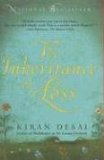Summary | Excerpt | Reading Guide | Reviews | Beyond the Book | Readalikes | Genres & Themes | Author Bio

Critics' Opinion:
Readers' Opinion:
First Published:
Jan 2006, 336 pages
Paperback:
Aug 2006, 384 pages
 Book Reviewed by:
Book Reviewed by:
BookBrowse Review Team
Buy This Book
These familiar lines allowed the boys to ease still further into their role, which he had handed to them like a gift.
“Who
wants to kill you?” they said to the cook. “We’re just hungry, that’s
all. Here, your sahib will help you. Go on,” they said to the judge,
“you know how it should be done properly.” The judge didn’t move, so
the boy pointed the gun at Mutt again.
The judge grabbed her and put her behind him.
“Too soft-hearted, sahib. You should show this kind side to your guests, also. Go on, prepare the table.”
The
judge found himself in the kitchen where he had never been, not once,
Mutt wobbling about his toes, Sai and the cook too scared to look,
averting their gaze.
It came to them that they might all die
with the judge in the kitchen; the world was upside down and absolutely
anything could happen. “Nothing to eat?”
“Only biscuits,” said Sai for the second time that day.
“La!
What kind of sahib?” the leader asked the judge. “No snacks! Make
something, then. Think we can continue on empty stomachs?”
Wailing and pleading for his life, the cook fried pakoras, batter hitting the hot oil, this sound of violence seeming an appropriate accompaniment to the situation.
The
judge fumbled for a tablecloth in a drawer stuffed with yellowed
curtains, sheets, and rags. Sai, her hands shaking, stewed tea in a pan
and strained it, although she had no idea how to properly make tea this
way, the Indian way. She only knew the English way.
The boys
carried out a survey of the house with some interest. The atmosphere,
they noted, was of intense solitude. A few bits of rickety furniture
overlaid with a termite cuneiform stood isolated in the shadows along
with some cheap metal-tube folding chairs. Their noses wrinkled from
the gamy mouse stench of a small place, although the ceiling had the
reach of a public monument and the rooms were spacious in the old
manner of wealth, windows placed for snow views. They peered at a
certificate issued by Cambridge University that had almost vanished
into an overlay of brown stains blooming upon walls that had swelled
with moisture and billowed forth like sails. The door had been closed
forever on a storeroom where the floor had caved in. The storeroom
supplies and what seemed like an unreasonable number of emptied tuna
fish cans, had been piled on a broken Ping-Pong table in the kitchen,
and only a corner of the kitchen was being used, since it was meant
originally for the slaving minions, not the one leftover servant.
“House needs a lot of repairs,” the boys advised.
“Tea is too weak,” they said in the manner of mothers-in-law. “And not enough salt,” they said of the pakoras. They
dipped the Marie and Delite biscuits in the tea, drew up the hot liquid
noisily. Two trunks they found in the bedrooms they filled with rice,
lentils, sugar, tea, oil, matches, Lux soap, and Pond’s Cold Cream. One
of them assured Sai: “Only items necessary for the movement.” A shout
from another alerted the rest to a locked cabinet. “Give us the key.”
The
judge fetched the key hidden behind the National Geographics that, as a
young man, visualizing a different kind of life, he had taken to a shop
to have bound in leather with the years in gold lettering.
They
opened the cabinet and found bottles of Grand Marnier, amontillado
sherry, and Talisker. Some of the bottles’ contents had evaporated
completely and some had turned to vinegar, but the boys put them in the
trunk anyway.
“Cigarettes?”
There were none. This angered
them, and although there was no water in the tanks, they defecated in
the toilets and left them stinking. Then they were ready to go.
Copyright © 2006 by Kiran Desai. Reprinted with permission from Grove Atlantic, Inc. All rights reserved.





The Funeral Cryer by Wenyan Lu
Debut novelist Wenyan Lu brings us this witty yet profound story about one woman's midlife reawakening in contemporary rural China.
Your guide toexceptional books
BookBrowse seeks out and recommends the best in contemporary fiction and nonfiction—books that not only engage and entertain but also deepen our understanding of ourselves and the world around us.